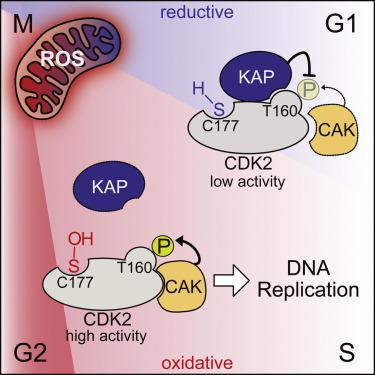Developmental Cell ( IF 10.7 ) Pub Date : 2022-07-08 , DOI: 10.1016/j.devcel.2022.06.008 Dilyana Georgieva Kirova 1 , Kristyna Judasova 1 , Julia Vorhauser 2 , Thomas Zerjatke 3 , Jacky Kieran Leung 4 , Ingmar Glauche 3 , Jörg Mansfeld 2

|
Reactive oxygen species (ROS) at the right concentration promote cell proliferation in cell culture, stem cells, and model organisms. However, the mystery of how ROS signaling is coordinated with cell cycle progression and integrated into the cell cycle control machinery on the molecular level remains unsolved. Here, we report increasing levels of mitochondrial ROS during the cell cycle in human cell lines that target cyclin-dependent kinase 2 (CDK2). Chemical and metabolic interferences with ROS production decrease T-loop phosphorylation on CDK2 and so impede its full activation and thus its efficient DNA replication. ROS regulate CDK2 activity through the oxidation of a conserved cysteine residue near the T-loop, which prevents the binding of the T-loop phosphatase KAP. Together, our data reveal how mitochondrial metabolism is coupled with DNA replication and cell cycle progression via ROS, thereby demonstrating how KAP activity toward CDKs can be cell cycle regulated.
中文翻译:

ROS依赖性机制促进CDK2磷酸化以推动S期进展
适当浓度的活性氧 (ROS) 可促进细胞培养、干细胞和模型生物中的细胞增殖。然而,ROS信号如何与细胞周期进程协调并在分子水平上整合到细胞周期控制机制中的谜团仍未解开。在这里,我们报告了靶向细胞周期蛋白依赖性激酶 2 (CDK2) 的人类细胞系细胞周期中线粒体 ROS 水平的增加。对 ROS 产生的化学和代谢干扰会降低 CDK2 上的 T 环磷酸化,从而阻碍其完全激活,从而阻碍其有效的 DNA 复制。ROS 通过氧化 T 环附近的保守半胱氨酸残基来调节 CDK2 活性,从而阻止 T 环磷酸酶 KAP 的结合。一起,











































 京公网安备 11010802027423号
京公网安备 11010802027423号